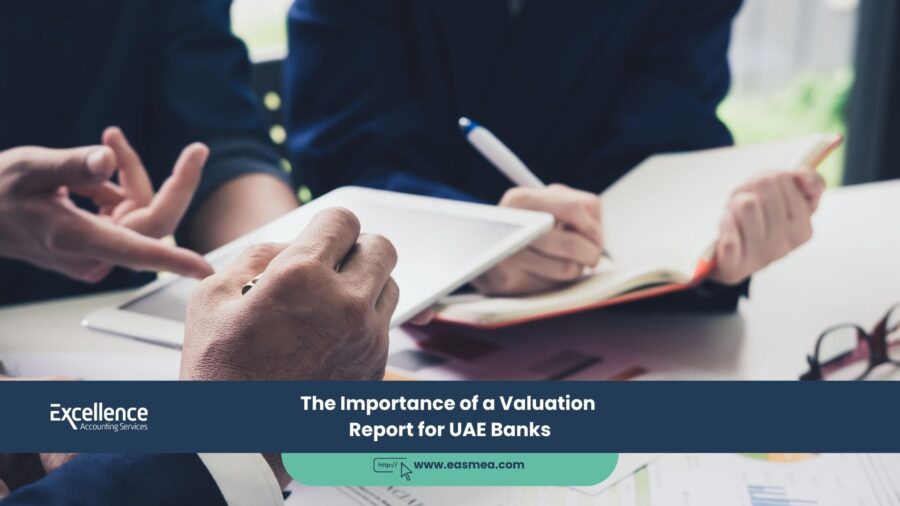The Importance of a Valuation Report for UAE Banks: A Pillar of Prudent Lending
In the world of finance, banks are not just facilitators of transactions; they are managers of risk. Every loan they extend, every facility they provide, is a carefully calculated risk. To make these calculations, banks rely on a bedrock of credible, objective information. When it comes to lending against business assets or financing corporate transactions, one of the most critical documents they require is a professional **business valuation report**.
- The Importance of a Valuation Report for UAE Banks: A Pillar of Prudent Lending
- The Banker's Perspective: Why Valuation is Crucial
- Key Scenarios Where UAE Banks Require a Valuation Report
- Providing Bank-Ready Valuations with Excellence Accounting Services (EAS)
- Frequently Asked Questions (FAQs)
- Seeking Bank Financing? Present Your Case with Confidence.
A valuation report is far more than a formality or a box-ticking exercise. For a bank, it is a fundamental risk management tool. It provides an independent, defensible assessment of a company’s or an asset’s worth, which informs the entire lending decision. It helps the bank understand the value of the collateral securing its loan, assess the repayment capacity of the borrower, and ensure its decisions align with the strict regulatory standards set by the Central Bank of the UAE.
This guide explores why valuation reports are indispensable for UAE banks. We will detail the key scenarios in which a valuation is required, what bankers look for in a credible report, and how a professional, independent valuation serves as a pillar of stability for both the bank and its clients.
Key Takeaways
- Valuation is a Core Risk Management Tool: Banks use valuation reports to assess the value of collateral and the overall risk associated with a loan.
- Independence is Non-Negotiable: Banks will only accept valuation reports from approved, independent, and reputable third-party firms to ensure the assessment is unbiased.
- Key Scenarios: Valuations are crucial for SME and corporate lending, M&A financing, project finance, and when assessing impaired loans.
- Methodology Matters: A credible report must use recognized valuation methodologies (like DCF, Market, and Asset-based approaches) and clearly justify all assumptions.
- It’s More Than Just a Number: Banks scrutinize the entire report—the assumptions, the risk factors, and the quality of the analysis—not just the final valuation figure. A professional business valuation provides this depth.
The Banker’s Perspective: Why Valuation is Crucial
From a bank’s point of view, a loan is an asset. The value and security of that asset depend on the borrower’s ability to repay and the value of any collateral pledged. A valuation report provides critical insights into both.
- Collateral Assessment: If a business pledges its assets (like machinery, inventory, or the entire company) as security, the bank needs to know what those assets are realistically worth in a potential default scenario.
- Repayment Capacity Analysis: A valuation, particularly one using the Discounted Cash Flow (DCF) method, provides a deep dive into a company’s ability to generate future cash flow—the very cash flow that will be used to service the loan.
- Regulatory Compliance: The Central Bank of the UAE has stringent regulations (like IFRS 9) that require banks to properly value their assets and provisions for potential losses. Independent valuations are a key part of this compliance framework.
- Informed Decision-Making: A robust valuation provides the credit committee with the objective data needed to approve a loan, set appropriate interest rates, and define the terms and covenants of the loan agreement.
For a bank, a loan is an investment in a business’s future. A valuation report is the due diligence on that investment.
Key Scenarios Where UAE Banks Require a Valuation Report
A request for a valuation report can be triggered by several common financing scenarios.
1. SME and Corporate Lending
When a business applies for a term loan or a working capital facility, especially if it’s significant, the bank will often require a valuation. This is particularly true if the loan is secured by the business’s assets rather than just real estate. The valuation helps the bank understand the overall enterprise value and the quality of the assets it is lending against.
2. Mergers and Acquisitions (M&A) Financing
If a company is seeking a loan to acquire another business, the bank will insist on an independent valuation of the target company. The bank needs to be confident that its client is not overpaying for the acquisition, as this could jeopardize the financial health of the combined entity and its ability to repay the acquisition debt. This is a core part of M&A due diligence.
3. Project Finance
For large-scale projects like infrastructure or real estate developments, banks need to assess the economic viability of the entire project. A detailed feasibility study, which includes a valuation of the completed project based on projected cash flows, is essential for the bank to commit to long-term financing.
4. Impaired Loans and Restructuring
If a borrower is struggling to meet its loan obligations, the bank needs to assess its position. It will often commission a new valuation of the business or its assets to understand the current market value of its collateral and to determine the best course of action, whether it’s restructuring the loan or beginning recovery proceedings.
Providing Bank-Ready Valuations with Excellence Accounting Services (EAS)
At Excellence Accounting Services (EAS), we have extensive experience in preparing independent, robust valuation reports that meet the stringent requirements of UAE banks and financial institutions.
- Independent and Objective Reports: We are an independent firm, ensuring our valuation reports are unbiased and credible, a key requirement for all banks.
- Approved Methodologies: Our business valuation experts use internationally accepted methodologies and provide clear, defensible justifications for all assumptions, standing up to the scrutiny of credit committees.
- Comprehensive Financial Analysis: Our reports go beyond a single number. We provide in-depth analysis of a company’s financial health, cash flow projections, and risk factors, giving banks the comprehensive information they need.
- Lender Negotiation Support: As part of our CFO services, we can help you prepare the entire financial package for your loan application and assist in discussions with the bank, using the valuation report as a key supporting document.
Frequently Asked Questions (FAQs)
No. Banks will almost always reject an internal valuation due to the inherent conflict of interest. They require a valuation performed by an approved, independent third-party valuation firm to ensure objectivity.
Many banks maintain a panel of pre-vetted and approved valuation firms whose reports they trust. Being on this panel means the firm has met the bank’s standards for quality, independence, and expertise. Using a firm from the bank’s panel can often streamline the loan approval process.
While the methodologies might be similar, the perspective is different. A valuation for bank lending often takes a more conservative approach, focusing on the value of assets as collateral and the sustainability of cash flow for debt repayment. A valuation for a shareholder dispute might focus more on determining a “fair market value” for an equity transaction between parties.
First, you should review the report with the valuation firm to understand their assumptions. If you believe there are factual errors, you can contest them. However, if the valuation is sound, it may mean you need to adjust your expectations. This could involve seeking a smaller loan amount, offering additional collateral, or demonstrating stronger future cash flows.
This depends on the bank’s policy and who commissioned the report. If the bank commissioned the report directly for its own internal risk assessment, they might only share the final valuation figure. If you commissioned the report from an approved firm to submit with your application, you will receive the full report.
The cost depends entirely on the size and complexity of the business being valued. A valuation for a small trading company will be significantly less than one for a large manufacturing group. The cost should be seen as a necessary investment in securing financing.
A distressed valuation assesses what a business or its assets would be worth in a forced or liquidation scenario, which is different from its value as a healthy “going concern.” Banks are very interested in this value as it represents their potential recovery in a worst-case scenario.
For term loans, the initial valuation is usually sufficient unless there is a major change in the business. For revolving credit facilities or lines of credit, a bank may require an updated valuation annually or bi-annually as part of its regular credit review process.
Potentially, yes. A high-quality valuation that demonstrates a strong asset base, stable cash flows, and low risk can give the bank more confidence. This reduced perceived risk can translate into more favorable lending terms, including the interest rate.
Beyond the final number, the most important thing is the **quality and defensibility of the assumptions**. A bank’s credit team will scrutinize the growth rates, profit margins, and discount rates used. A report that clearly explains and justifies these assumptions is far more credible and useful than one with an attractive number based on flimsy logic.
Conclusion: The Language of Trust in Finance
In the relationship between a business and its bank, trust and transparency are paramount. A professional, independent business valuation report is a key part of that language of trust. It provides an objective, data-driven foundation that allows banks to lend with confidence, manage their risk effectively, and support the growth of their clients. For any business seeking financing, investing in a high-quality valuation is not just a requirement; it’s a strategic step towards building a strong and lasting banking partnership.
Seeking Bank Financing? Present Your Case with Confidence.
Partner with Excellence Accounting Services to prepare a robust valuation report that meets the stringent standards of UAE banks.




